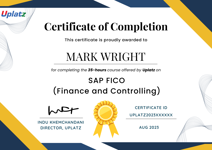
Engineering Lead Career Path
Self-paced videos, Lifetime access, Study material, Certification prep, Technical support, Course Completion Certificate
Uplatz
Summary
- Uplatz Certificate of Completion - Free
Add to basket or enquire
Overview
Uplatz provides this powerful and extensive Career Path program to help you become an Engineering Lead. It is a program covering all topics related to Software Engineering and Technology in the form of self-paced video tutorials. You will be awarded Course Completion Certificate at the end of the course.
An Engineering Lead is a role within an engineering or technical team responsible for providing leadership, direction, and guidance to a group of engineers or developers. This role focuses on both technical expertise and people management skills. Here are the key responsibilities and attributes associated with an Engineering Lead:
Responsibilities of an Engineering Lead
Technical Leadership: Provide technical expertise and guidance to the engineering team. Help the team navigate complex technical challenges, make informed decisions, and choose appropriate solutions.
Project Management: Oversee and manage engineering projects. Define project goals, scope, and timelines. Coordinate tasks, allocate resources, and ensure projects are delivered on time and within budget.
Team Management: Lead and mentor a team of engineers. Set performance expectations, provide regular feedback, and support career growth and development.
Code Review and Quality Assurance: Review code submissions for quality, consistency, and adherence to coding standards. Provide constructive feedback to team members.
Collaboration: Work closely with cross-functional teams, such as product managers, designers, and stakeholders, to understand requirements, prioritize tasks, and deliver successful products.
Technical Strategy: Contribute to the development of technical strategies, roadmaps, and architecture decisions that align with the organization's goals.
Problem-Solving: Identify technical challenges and work with the team to find innovative solutions. Help troubleshoot issues and provide guidance in resolving complex problems.
Communication: Communicate technical concepts and project updates effectively to both technical and non-technical stakeholders. Foster open communication within the team.
Attributes of an Engineering Lead
Technical Expertise: Possess a deep understanding of relevant technologies, programming languages, and software development principles. Stay up-to-date with industry trends.
Leadership Skills: Demonstrate strong leadership qualities, including the ability to inspire, motivate, and empower team members. Lead by example and encourage a collaborative environment.
Problem-Solving: Exhibit strong problem-solving skills and a proactive approach to addressing challenges. Encourage the team to think critically and find creative solutions.
Communication: Communicate clearly and effectively with team members and stakeholders. Translate complex technical concepts into understandable language.
Team Building: Build a cohesive and high-performing engineering team. Foster a culture of teamwork, innovation, and continuous improvement.
Adaptability: Thrive in dynamic and fast-paced environments. Adapt to changing priorities, technologies, and project requirements.
Decision-Making: Make informed decisions that balance technical considerations with business objectives. Delegate responsibilities effectively.
Strategic Thinking: Understand the bigger picture and contribute to the long-term technical and business strategies of the organization.
The role of an Engineering Lead is essential for driving technical excellence, successful project outcomes, and the growth and development of the engineering team. It requires a combination of technical acumen, leadership skills, and the ability to navigate both technical and interpersonal challenges.
Course media
Description
An Engineering Lead requires a combination of technical expertise, leadership skills, and a deep understanding of various technologies. Here's a list of technologies and skills that are important for an Engineering Lead to possess:
1. Technical Expertise:
- Programming Languages: Proficiency in programming languages relevant to your field (e.g., Java, Python, JavaScript, C++, etc.).
- Frameworks and Libraries: Knowledge of relevant frameworks and libraries for software development, such as React, Angular, Spring, etc.
- Database Management: Understanding of database systems and query languages (e.g., SQL, NoSQL databases).
- Cloud Platforms: Familiarity with cloud platforms like AWS, Azure, or Google Cloud for scalable and reliable applications.
- DevOps Tools: Experience with tools like Docker, Kubernetes, Jenkins for continuous integration and deployment.
2. Architecture and Design:
- System Architecture: Ability to design scalable, reliable, and maintainable systems.
- Microservices: Knowledge of microservices architecture and its implementation.
- API Design: Understanding of API design principles for building robust and well-documented APIs.
- Database Design: Proficiency in designing efficient and normalized database schemas.
3. Project Management:
- Agile Methodologies: Experience with Agile methodologies (Scrum, Kanban) and familiarity with project management tools.
- Scope Management: Ability to define and manage project scope, ensuring projects stay on track.
- Resource Allocation: Allocate resources effectively to meet project goals within budget and timelines.
4. Leadership and Soft Skills:
- Communication: Excellent communication skills to convey technical concepts to both technical and non-technical stakeholders.
- Empathy: Understand team members' needs, concerns, and provide support.
- Team Building: Create a collaborative environment, resolve conflicts, and build a cohesive team.
- Decision-Making: Make informed decisions that balance technical and business considerations.
- Problem-Solving: Analyze complex problems, identify solutions, and guide the team in finding resolutions.
5. Continuous Learning:
- Industry Trends: Stay updated with the latest trends in technology, software development, and engineering practices.
- Adaptability: Be open to learning new technologies and approaches as the industry evolves.
6. Mentorship and Coaching:
- Career Development: Help team members set goals, provide mentorship, and support their career growth.
- Feedback: Provide constructive feedback and guidance for skill improvement.
7. Business Acumen:
- Understanding of Business Goals: Align technical decisions with the organization's business objectives.
- ROI Analysis: Ability to evaluate the impact and ROI of technical initiatives.
8. Security and Compliance:
- Security Awareness: Ensure applications and systems adhere to security best practices and compliance requirements.
9. Data Analysis and Interpretation:
- Data-driven Decision Making: Analyze data to make informed technical and strategic decisions.
The specific technologies and skills required can vary based on the industry, organization, and role's focus. Being an effective Engineering Lead is not only about technical prowess but also about facilitating collaboration, guiding the team, and delivering successful projects that align with the organization's goals.
Who is this course for?
Everyone
Requirements
Zeal and passion to make it big!
Career path
- Engineering Lead
- Engineering Manager
- Technical Lead
- Development Team Lead
- Software Engineering Lead
- Lead Engineer
- Engineering Group Manager
- Principal Engineer
- Engineering Supervisor
- Engineering Director
- Software Development Manager
- Team Lead (Engineering)
- Lead Developer
- Lead Architect
- Technical Manager
- Engineering Lead Consultant
- Technology Consultant
- IT Consultant
- Chief Technology Officer (CTO)
Questions and answers
Currently there are no Q&As for this course. Be the first to ask a question.
Certificates
Uplatz Certificate of Completion
Digital certificate - Included
Course Completion Certificate by Uplatz
Reviews
Currently there are no reviews for this course. Be the first to leave a review.
Legal information
This course is advertised on reed.co.uk by the Course Provider, whose terms and conditions apply. Purchases are made directly from the Course Provider, and as such, content and materials are supplied by the Course Provider directly. Reed is acting as agent and not reseller in relation to this course. Reed's only responsibility is to facilitate your payment for the course. It is your responsibility to review and agree to the Course Provider's terms and conditions and satisfy yourself as to the suitability of the course you intend to purchase. Reed will not have any responsibility for the content of the course and/or associated materials.



